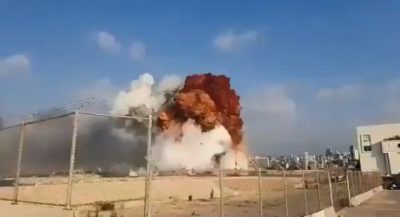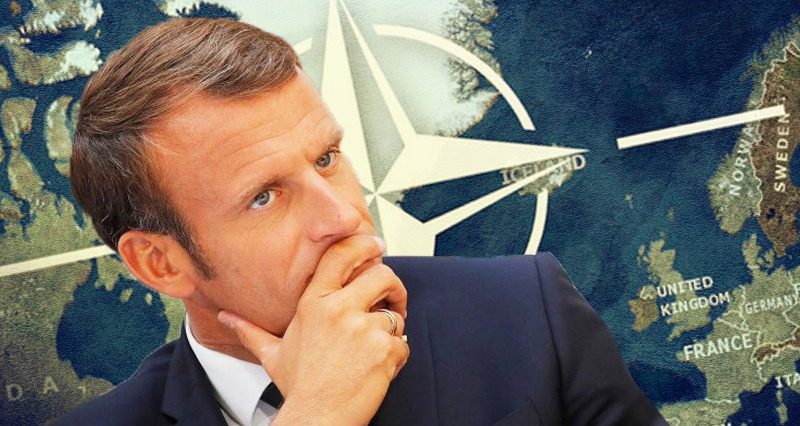Lebanon: President Macron Pushes “Neo-expansionism”

The current geopolitical position of France is shaped by a variety of factors. As one of the key actors in the Mediterranean region, Paris is now primarily a European leader in countering Turkey’s expansionist policy. Relations between the two countries are complicated by the necessity to reckon with the activation of significant global processes, the destruction of the system of international law, the diminishing role of the Washington establishment in particular in the Mediterranean region and to a greater extent in the Middle East, while the influence of Turkey and Russia increases in the region.
The changing balance of power in the entire Mediterranean region encourages regional players to actively integrate into the current geopolitical agenda. So Macron, in his turn, decided to gain the moment and go on a geostrategic offensive. First of all, such a turn towards an active independent foreign policy, largely aimed at deterring Turkey, is observed in the framework of the Libyan conflict, where Paris tends to support the Tobruk government in the framework of an international coalition that includes Egypt and the United Arab Emirates. Moreover, France has a security cooperation agreement with Cyprus, which entered into force on August 1. Egypt and Greece also signed an agreement in Cairo on Thursday to demarcate their maritime borders and establish an exclusive economic zone. Given the close cooperation between members of the emerging Egypt-Greece-France trilateral Mediterranean partnership, it can be assumed that Turkey risks remaining isolated in the next few years. It follows that Ankara will strengthen the opposition and will make a major effort to destabilize a potential alliance.
The new second vector of French foreign policy in the region is largely determined by Macron’s opportunistic policy and represents an unprecedented increase in influence in Lebanon.
 Lebanon has historically had close ties with France. After the First World War and the collapse of the Ottoman Empire, the League of Nations approved in 1923 the French mandate in Syria and Lebanon. Despite the fact that the mandate was valid only until 1943, the French military left the territory of Syria and Lebanon only in 1946. Of course, France retains a great influence in Lebanon, which in turn alarms regional actors such as Egypt.
Lebanon has historically had close ties with France. After the First World War and the collapse of the Ottoman Empire, the League of Nations approved in 1923 the French mandate in Syria and Lebanon. Despite the fact that the mandate was valid only until 1943, the French military left the territory of Syria and Lebanon only in 1946. Of course, France retains a great influence in Lebanon, which in turn alarms regional actors such as Egypt.
The large explosions that took place in the port of the Lebanese capital, Beirut, on August 4, led to horrific consequences in the country, including further deterioration of the economic situation, which was already significantly weakened, inter alia by the COVID-19 pandemic. Even before the outbreak of the pandemic and the explosions in Beirut, about 50% of the country’s population lived below the poverty line, and the unemployment rate reached 35%. The terrible accident was a kind of trigger that marked not only the need to change the political course, but also a new round of geopolitical confrontation between regional actors.
On August 7, Macron flew to visit Beirut, which was destroyed by the explosion. After a demonstrative visit to the most affected areas, the French President met with Lebanese President Michel Aoun.
In his statement, Macron not only expressed his condolences to the entire population of Lebanon, specifying that at least 50 French citizens were also injured by the explosion, but also announced the humanitarian assistance provided to Lebanon.
“As always, France will be here to help as we have the relationships of solidarity and friendship that we have maintained with the Lebanese people for decades,” said Prime Minister Jean Castex. This “tragedy of exceptional magnitude” touches “a friendly country, a country that is also in difficulty”.
French aid is delivered by three military aircraft cantaining food and medical aid to the Lebanese capital. These aircraft carry a civil security detachment (55 people, 15 tons of equipment) and a mobile health post including 6 tons of equipment and allowing the care of 500 wounded, accortding to the Elysée.
In addition, France apparently plans to take patronage over the delivery of international humanitarian aid to the affected areas. According to the French head of State, “an international conference of support” will soon be organized to mobilize international funding for Lebanon.
“France will also be there to organize international aid alongside the European Union, the United Nations and with the support of the World Bank. In the next few days we will organize – and the Minister of Europe and Foreign Affairs has already begun to make the first contacts and mobilize his teams-an international conference of support to Beirut and the Lebanese population,” said the French leader.
However, heading to Beirut, Macron was carrying not only humanitarian aid, but also a “new political pact.” French President said he would pitch a “new political deal” to the Lebanon leadership.
“Strong initiatives are needed to fight corruption against the opacity of the banking system”. He also called for “the initiation of an IMF program” and the continuation of “the CEDRE plan”. The economic conference for the development of Lebanon through reforms and with companies (CEDRE), which took place on April 6, 2018 in Paris, aimed to support the development and strengthening of the Lebanese economy, through a comprehensive plan of reforms and infrastructure investments prepared by the Lebanese authorities. The conference had been used to raise funds. But very quickly, donors, whose pledges had reached $ 11.6 billion, had expressed doubts about the credibility of the programe, which implementation had been delayed by political instability.
Macron claimed:
“I spoke frankly and transparently with the president regarding the need to fight corruption, implement reforms, conduct a transparent investigation into what is happening in the banking system, and continue dialogue with the IMF.”
Continuing to leave the diplomatic framework, which already brings him some accusations of interference, he returned to this “political, moral, economic and financial crisis in which the political class bears a historical responsibility “, wishing “investigations that can take place in a transparent framework “.
Macron said he would demand accountability from the authorities and that he would return on September 1 and if the proposed “political Pact” was not implemented, he would be forced to take measures.
Of course, Macron faced a great support from the local population. The Lebanese surrounding the president’s procession, accompanied it with songs, cries, slogans, as ” Revolution !”, assistance alternated with the denunciation of Michel Aoun. “Michel Aoun, terrorist!” “You freed us from the Ottomans. Free us from the current authorities.” Disillusioned Lebanese citizens created an online petition demanding to place Lebanon under French mandate for the next 10 years. In less than 6 hours it has already reached more than 20 thousand signatures.
Due to the fact that the meeting itself and the “frank conversation” between Macron and the Lebanese leadership was private, various rumors have emerged. For example, that Macron’s representative voiced the following imperatives to Michel Aoun:
- Declaration of Beirut as a demilitarized zone
- Full disarmament of Hizbollah’s offices in and around the capital, as well as elimination of all Hizbollah’s rocket forces and installations in the South of the country, and submitting of its command posts to UNIFIL
- Submitting of Beirut international airport to a joint international contingent led by Germany
- Dissolution of Parliament and the government and holding of snap elections followed by the election of a new President.
These statements, allegedly made by the French side, are clearly pro-Israeli in nature and are primarily directed against Hizbollah.
The reliability of this information, which has passed through various information channels, is highly questionable. It is likely that such information injection is carried out by one of the parties of the regional conflict.
Analyzing the theses allegedly proposed by Macron’s representative to the President of Lebanon, it is difficult to believe in their authenticity. Macron is a fully mature politician and it is unlikely that he and his team have taken such openly provocative steps. Therefore, the demands for immediate early elections and the disarmament of the Hizbollah movement are most likely fake. However, Macron’s actions and the pressure that he exerts on the leadership of Lebanon, which is in a difficult situation, can be described by the French word “chantage”.
*
Note to readers: please click the share buttons above or below. Forward this article to your email lists. Crosspost on your blog site, internet forums. etc.
SUPPORT SOUTHFRONT:
PayPal: [email protected], http://southfront.org/donate/ or via: https://www.patreon.com/southfront
Featured image is from South Front



